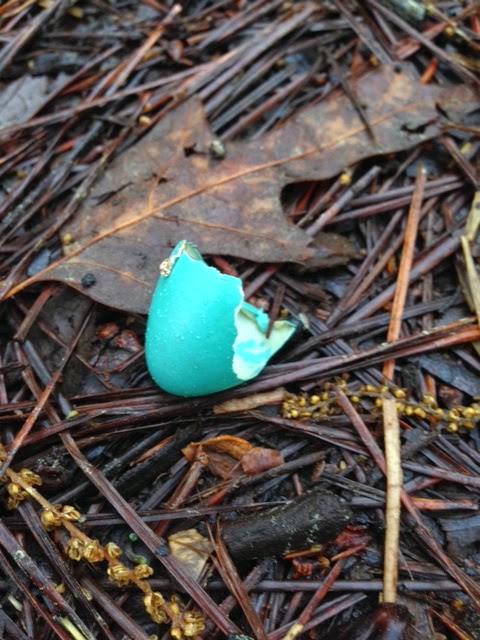Be EGG-cellent to your feathered friends and their youngsters.
By Creature Feature In Critter Corner, Uncategorized  |
| A broken egg is a clue to the fact that a young bird has hatched |
Hey there animal friends,
It’s time for another post. Wildlife questions and baby animal calls have been coming in quite a bit lately. At this time of the year, many young animals are coming out of the protective embraces and nests of their parents to start exploring the big wide world and learn to become successful adults like mom and dad. We get many calls right now about baby birds that are on the ground and can’t fly. This is a normal stage of growth that these young ones need to accomplish to become a successful adult. Contrary to what you may think, these babies are not injured. They are often pushed out of the nest or fall out of the nest on purpose so they can start to be on their own. Believe it or not, the parent birds are still taking care of these wayward youngsters while they are learning to forage. The parents will often go away and leave these little guys alone for periods of time. The babies stay on the ground because their tail feathers haven’t fully grown in and they need a little time to fill out. Most of the time, they are perfectly alright if left alone and not picked up. It’s a crucial stage in a young bird’s growth cycle and it has a better chance of survival if it’s left in its parents’ care. Many well-meaning folks will pick up these youngsters thinking they are helping when really they may be doing more harm than good. The situation could be called a “kidnapping” of sorts, if the young bird is picked up and removed from its surroundings. It’s difficult to leave a cute little critter outside on the lawn when it’s hopping around and calling out, but if you approach the baby, often mom and dad will be nearby watching what you are doing. If you’re pretty observant, and listen closely, you may see an upset parent hopping and fluttering around up in the trees or shrubs around the location of the baby. You will hear the parent bird above, calling and fussing quite aggressively, which is bird talk for “Oh no, a big and scary predator is near my baby and is going to hurt my baby, but I’m too nervous to come down….because the big and scary predator might get me too….” The best and most helpful thing to do is to leave to young bird where it is if at all possible. It’s most likely not “orphaned” as you might think. If there’s a threat near by such as the neighbor’s cat or dog, or even some inquisitive neighborhood children, it’s alright to scoop up the baby and place it under cover of a nearby shrub, tree, or high grass. When you do that, you may hear the parents scolding you, but they usually calm down once they know the baby is not going to be in danger. A few birds are exceptions to staying up in the tree and fussing. They may decide to dive at you as you are interacting with the youngster, but they will often warn you before actually making contact with your head or body. Some examples of these more aggressive parents might be Robins, Thrashers, Mockingbirds and Bluejays. If they are super aggressive, a way to avoid feeling the wrath of the bill is to wear a hat or baseball cap while you are moving the baby. Once the baby is moved out of harms’ way, mom and dad bird, as well as junior, will be much happier and less stressed if left alone. By leaving them alone and letting the parent birds do their job, we help them to become more strong and successful, because mom and dad bird can raise their babies to become healthy adults.






Angela Callis
My dog brought me a very young baby bird from my back yard. Unfortunately, I can’t leave him there because I have cats and dogs which will eat him. I have put him in a container on top of an awning in hopes mom and dad will take care of him. How long should I wait to make sure he’s doing OK? The baby is very small-maybe only about 2 inches. Any help you could give would be appreciated. Thanks.
Critter Corner
As long as the baby is near where you found him, the parents should find him. Don’t linger right in the area because that may scare parents. Try to watch from a little distance. Be patient, it may take a bit. If he’s really abandoned, you can call for further advice. We aren’t really a rehab facility, so I would suggest calling the Newport News park discovery center if you are in Newport News. If not in NN, I would suggest getting in touch with Wildlife Response.(757)543-7000 They are south side and are a network of rehabilitators who are a good source for that type of situation. It’s a hotline, so you’ll have to leave a message, but they’ll get back with you as soon as they can. Keep in mind that this is the busy season for them, so it may take them a bit. But more than likely, the baby is being taken care of even if you don’t see the parents right away.